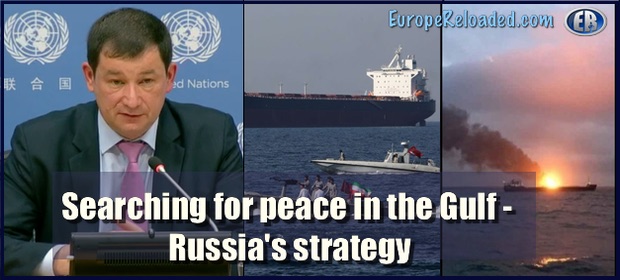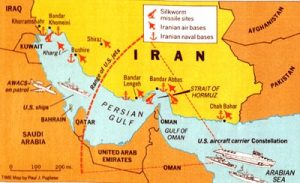
There is an eminently reasonable and feasible way to avoid conflict in the Persian Gulf, and to secure peace. The principles of multilateralism and international law must be adhered to. It seems almost astounding that one has to appeal for such obvious basic norms.
Fortunately, Russia has presented a roadmap for implementing a security concept in the vital waterway based on the above principles.
Russia’s deputy envoy to the United Nations, Dmitry Polyansky, outlined a possible international coalition to provide security for commercial shipping through the strategically important Persian Gulf. The narrow outlet accounts for up to 30 per cent of all globally shipped oil on a daily basis. Virtually every nation has a stake in the safe passage of tankers. Any disruption would have huge negative consequences for the world economy, impacting all nations.
The Russian proposal, which has been submitted to the UN Security Council, is currently being considered by various parties. Crucially, the security concept put forward by Moscow relies on the  participation of the Gulf nations, including Iran. Rather than being led by an outside power, the Russian proposal envisages a region-led effort.
participation of the Gulf nations, including Iran. Rather than being led by an outside power, the Russian proposal envisages a region-led effort.
This multilateral arrangement for cooperation between nations is solidly within the principles of the UN Charter and international law. Potentially, it can build trust and positive relations, and thereby reduce the climate of tensions and uncertainty which have intensified over recent months, primarily between the United States and Iran.
Washington has blamed Iran for several sabotage incidents on commercial shipping since June. The Americans have not provided any proof for their claims. Iran, for its part, denies any malfeasance and instead has pointed to “malign conspiracy” aimed at stoking tensions or, worse, precipitating an all-out military confrontation between the US and Iran. Significantly, too, the problem of alleged sabotage and danger to shipping followed the increased deployment of US forces in the region during May, ostensibly to counter anticipated “Iranian aggression”.
One thing for sure is that the US proposal for a naval coalition led by Washington, purportedly to “protect shipping” in the Gulf, is a non-starter. Most nations have rebuffed the American plan. Germany, France and other European Union states have given it a resounding pass. Even Arab nations allied with the US, such as Saudi Arabia and the United Arab Emirates, have demurred on the idea. Significantly, too, the Gulf states have refrained from following Washington’s line of fingering Iran for the unknown sabotage incidents.
After weeks of lobbying for its US-led “navy coalition”, Washington appears to have recruited just two other partners: Britain and Israel.
The term “coalition” is therefore a misnomer in this context. It also has no credibility as a force serving to uphold international law and security. The position of the US-led axis is one of outright hostility towards Iran. It is premised on the flawed assumption that Iran is the “problem”.
Any such extra-regional military force is by definition a source of further insecurity and tensions in the Persian Gulf, as Iranian Foreign Minister Mohammad Javad Zarif has noted. Arguably, any such US-led deployment is illegal because it is not mandated by the UN Security Council. The US plan relies on a unilateral imposition of American force along with a coterie of allies who have a long history of facilitating Washington’s militaristic adventures.
Indeed, moreover, one can easily perceive that the US claims about maritime security and safe passage are dubious. What Washington appears to be doing is cynically using “security concerns” as a cover for forming an aggressive front against Iran. The real purpose is to augment the Trump administration’s “maximum pressure” policy towards Tehran in order to coerce that nation into ceding to American strategic demands. This US policy is, of course, illegitimate and arguably criminal. But it is being concealed, as the Americans usually do, with the pseudo-image of acting as the world’s “policeman”.
By contrast, it may be hoped that the UN and the nations of the Gulf region move forward to embrace Russia’s proposal for a genuinely cooperative, mutual effort to maintain peace. The only way forward is through multilateralism, mutual respect, dialogue and adherence to international law. Conflict is a lose-lose scenario. Peace is win-win.
Surely, if any party cannot support such a reasonable proposition, then the telling question is: why not? A negative response strongly suggests there is a disingenuousness about putative “security concerns”, and that an ulterior, sinister agenda is actually at play.
It should also be borne in mind that the present mounting tensions in the Persian Gulf have come about because the Trump administration took the reprehensible step of repudiating the international nuclear accord with Iran. That accord was signed by Iran, the US, Russia, China, Britain, France, Germany and the European Union back in July 2015. The international treaty was endorsed by the UN Security Council. When Trump walked away from the US legal obligation last year, all the tensions that we now see with Iran have transpired.
As Russian envoy Dmitry Polyansky told the press conference at the UN recently, it is incumbent on Washington to return to the nuclear accord. Until then, for Washington to pose as some kind of security arbiter in the Middle East is too ludicrous for words.
************
Original article

••••
The Liberty Beacon Project is now expanding at a near exponential rate, and for this we are grateful and excited! But we must also be practical. For 7 years we have not asked for any donations, and have built this project with our own funds as we grew. We are now experiencing ever increasing growing pains due to the large number of websites and projects we represent. So we have just installed donation buttons on our websites and ask that you consider this when you visit them. Nothing is too small. We thank you for all your support and your considerations … (TLB)
••••
Comment Policy: As a privately owned web site, we reserve the right to remove comments that contain spam, advertising, vulgarity, threats of violence, racism, or personal/abusive attacks on other users. This also applies to trolling, the use of more than one alias, or just intentional mischief. Enforcement of this policy is at the discretion of this websites administrators. Repeat offenders may be blocked or permanently banned without prior warning.
••••
Disclaimer: TLB websites contain copyrighted material the use of which has not always been specifically authorized by the copyright owner. We are making such material available to our readers under the provisions of “fair use” in an effort to advance a better understanding of political, health, economic and social issues. The material on this site is distributed without profit to those who have expressed a prior interest in receiving it for research and educational purposes. If you wish to use copyrighted material for purposes other than “fair use” you must request permission from the copyright owner.
••••
Disclaimer: The information and opinions shared are for informational purposes only including, but not limited to, text, graphics, images and other material are not intended as medical advice or instruction. Nothing mentioned is intended to be a substitute for professional medical advice, diagnosis or treatment.




